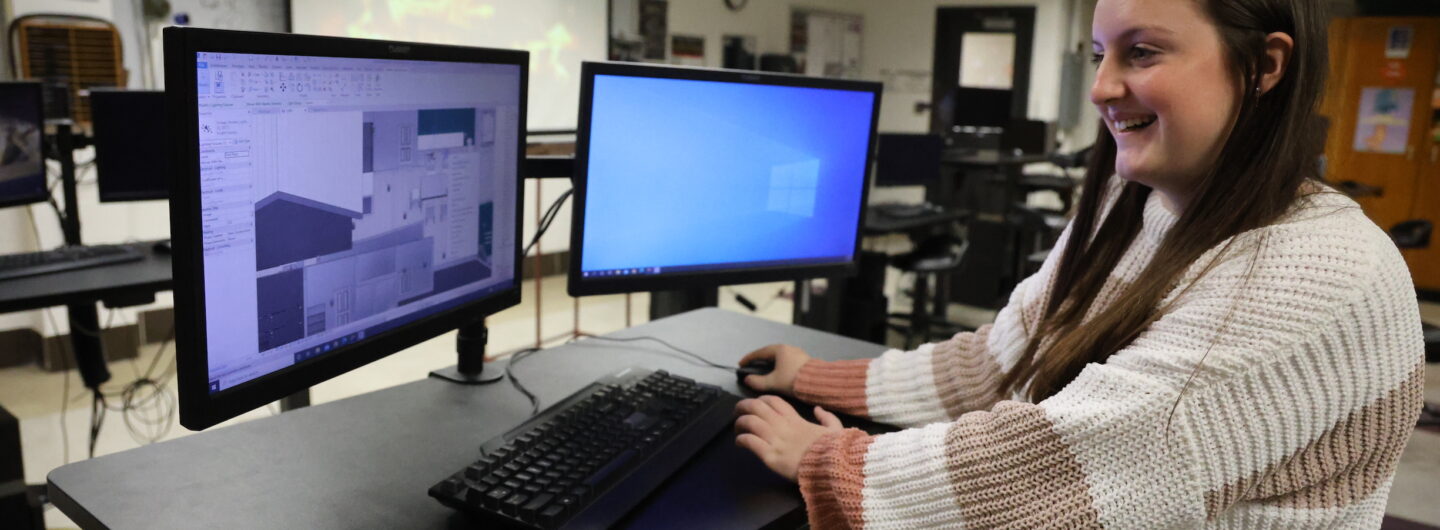This rigorous pathway is designed to equip students with the skills and knowledge necessary for careers in engineering, architecture, and related fields. This pathway combines technical coursework with hands-on projects, preparing students for both higher education and professional opportunities in various engineering disciplines.
Through a series of progressive courses, students gain hands-on experience with industry-standard software and tools, preparing them for both higher education and direct entry into technical careers. The pathway emphasizes problem-solving, design, and practical application of skills, along with 2D and 3D CAD techniques, ensuring students are well-equipped for future challenges and giving them hands-on experience using industry-standard software and tools.
Successful completion of these courses can also earn students college credits, making this pathway an excellent choice for those planning to pursue higher education or enter the workforce directly after high school.
Engineering/CAD Pathway at a Glance
Engineering/CAD Courses
Computer Aided Drafting 1, 2, 3 & 4; Introduction to Engineering; Principals of Engineering; Computer Integrated Manufacturing; PLTW Engineering Design Capstone
Other Suggested Courses
Introduction to Manufacturing, Machining and Manufacturing, Precision Machining and Manufacturing, Introduction to CNC Machining, Woodworking 1 & 2, Introduction to Welding
National Workforce Statistics for Engineers
| 2020 U.S. median pay | $90,160 per year/$43.35 per hour |
| No. of U.S. jobs in 2020 | 299,200 |
| Projected need | 20,900 annually |
Southeast Iowa Workforce Statistics
| Mechanical engineer wage | $40.47-$45.02 per hour |
| Openings per year | 15 |
Check out the Program of Studies for a complete list of course offerings and descriptions.
Engineering/CAD Pathway Courses, Learning Objectives & Areas of Focus
Computer-Aided Drafting I (CAD I)
This introductory course covers the fundamentals of 2D and 3D computer-aided drafting (CAD). It is essential for students interested in pursuing advanced industrial technology classes and registered apprenticeships.
CAD II
Building on CAD I, this course offers an in-depth exploration of Revit Architecture and Inventor Professional 3D modeling. It is ideal for students planning careers in engineering, architecture, and trade occupations.
CAD III
Students choose between architectural or mechanical drawing, utilizing AutoDesk Revit for residential house design or focusing on tolerance-based parts and dimensioning in mechanical drawing. Successful completion of CAD I, II, and III earns college credit for CAD-101 “Introduction to CAD.”
CAD IV
This advanced course delves deeper into architectural or mechanical drawing, reinforcing skills learned in previous CAD courses. Completion of CAD IV earns college credit for CAD-277 “3-D Dimensional Modeling I.”
Introduction to Engineering Design-Project Lead the Way
Students use a problem-solving model to improve existing products and invent new ones, using sophisticated 3D modeling software. This course emphasizes project-based learning and is suitable for all students interested in engineering and industrial vocations.
Principals of Engineering-PLTW
Students explore engineering systems and manufacturing processes through activity-based exercises. The course helps students understand career possibilities in engineering and develop problem-solving skills.
Computer Integrated Manufacturing-PLTW
This course covers manufacturing systems and processes, including CNC programming, robotics, and automated systems. It builds on knowledge from IED and POE, preparing students for careers in engineering and manufacturing technology.
Civil Engineering & Architecture-PLTW
Students study the design and construction of residential and commercial projects using Autodesk Revit. The course covers proper building construction and applicable building codes, providing a firm understanding of civil engineering principles.
Engineering Design & Development-PLTW Capstone
In this capstone course, students work in teams to design and develop an original solution to a technical problem. They engage in research, design, testing, and collaboration with industry professionals, culminating in a presentation to an outside panel.
Other Suggested Courses
Introduction to Manufacturing
Students learn basic measurement, planning, and layout skills related to metalworking. Activities include melting alloys, forming castings, and operating machine lathes to produce turned projects.
Machining & Manufacturing
This course provides hands-on experience with metal cutting machines, precision measurement, and CNC programming. It is ideal for students interested in machining, manufacturing engineering, and related fields.
Precision Machining & Manufacturing
Students operate CNC machines, lasers, and water jets, applying knowledge from previous courses to complete projects with precision tolerances.
Introduction to CNC Machining
This college credit course introduces students to CNC machining, covering G and M code programming, tooling, and CAM software. Students gain practical experience operating CNC machines.
Introduction to Welding
This course introduces welding processes such as oxyacetylene welding, arc welding, and MIG welding. Students gain hands-on experience with various metals and welding techniques.
Woodworking I
Designed for beginners, this course covers basic woodworking skills and safety. Students complete individual projects to develop their craftsmanship.
Woodworking II
Building on Woodworking I, this course emphasizes problem-solving and advanced woodworking techniques. Students design, plan, and construct projects, with a focus on safe equipment use.
Sara Parris
Industrial Technology Teacher & Advisor to Many Clubs- Burlington High School
- Email Sara Parris


